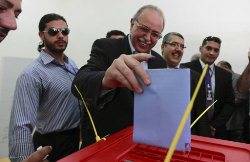Counting has begun following Libya's first free national elections in more than four decades, a ballot which took place amid violence by federalist protesters who disrupted the vote in several districts.
Voting ended officially at 8pm (1800:GMT), but delays in starting has caused the polls to stay open later in some areas of the country.
In Benghazi, Libya's second city, they closed on Saturday night after staying open for an extra hour; in Ajdabiya and other places further from the capital, where voting did not start until the afternoon, voting will continue as late as 7am on Sunday. Voting in Brega has still not yet started.
Turnout was 60 per cent, the electoral commission said, citing preliminary figures. "We are continuing to receive reports, but the number of voters has reached 1.6 million," said Nuri al-Abbar, the head of the commission.
Acts of sabotage, mostly in the east of the country, prevented 101 polling stations from opening on Saturday, the electoral commission said, although 94 per cent of stations managed to open.
On Friday, a helicopter carrying election material from Libya's eastern city of Benghazi was shot at in mid-flight, fatally wounding a member of Libya's High National Election Committee (HNEC) logistics team onboard.
The 2.8 million registered voters are electing a 200-seat General National Conference (GNC) that will replace the unelected interim government that has ruled the country after the revolution against Libya’s ousted leader Muammar Gaddafi.
Al Jazeera's David Poort, reporting from Tripoli, said that Nuri al-Abbar, the head of the electoral commission, brushed off most incidents that took place on Saturday and said that the elections overall have proven to be a success.
"Only seven polling stations could not open this morning because of protests in the east of the country. There were no violations reported in the west," said Abbar, speaking a press conference on Saturday evening.
"Some polling stations had some delay in receiving the voting material, but all these problems were solved in the course of this morning."
Historic, if tense elections
The 3,700 candidates - 2,500 of whom are independent, with the rest belonging to political parties - had until Thursday evening to reach out to voters, as the HNEC declared Friday a "cool-off day" ahead of the vote.
The new assembly will appoint a new cabinet and a prime minister, but will not choose the committee that would draft the country’s first constitution.
The key responsibility to appoint the constitutional committee was stripped away from the assembly by National Transitional Council decree on Thursday in a last-minute move to appease the eastern protesters who demand more autonomy for their region.
The mood has been tense in Libya’s second city, Benghazi, and other cities and towns in the eastern Cyrenaica region, where federalist groups vowed to boycott and even violently disrupt the vote.
Many residents of eastern Libya feel the distribution of seats in the General National Conference favors the west of the country.
A shoot-out took place in Adjabiya, where three federalists attempted to storm a polling station around midday, resulting in one of the men being killed by police. The other two were injured.
Al Jazeera's Hoda Abdel Hamid, reporting from Benghazi, said that on the whole "people are satisfied with how the elections have been going so far".
Critics say the process is a continuation of the alleged marginalization of their region that they say started decades ago under Gaddafi’s rule.
Paul Brennan, reporting from the capital, said: "By comparison, the situation in Tripoli is calm. We have not heard about the problems that Hoda reported in the east."
Seat allocations
The NTC has allotted seats in the GNC according to population, a democratic principle that is viewed with mistrust by the less-populated east.
Federalist protesters in Benghazi broke into the local election offices last Sunday and ransacked them.
On Thursday, protesters set fire to a warehouse in Ajdabiya where ballot papers and other campaign material were stored.
All material was lost in the fire, forcing the HNEC to print new ballot papers in Dubai.
Tribal clashes in the country’s isolated Kufra region in the far south have prevented election observers to visit the district, making it unlike that the vote will proceed there.
The Libyan Air Force will assist with collecting the ballot papers from across the vast county and bring them to a counting center in Tripoli, the HNEC said.
It is almost impossible to predict the outcome of the vote, as Libya is unfamiliar with pre-election opinion surveys or exit polls, but it seems likely that the Justice and Construction Party, widely considered to be the political arm of the Muslim Brotherhood, will gain substantial influence in the assembly.
PHOTO CAPTION
Libya's Prime Minister Abdurrahim El-Keib casts his ballot during the National Assembly election at a polling station in Tripoli July 7, 2012.
Al-Jazeera


 Home
Home Discover Islam
Discover Islam Quran Recitations
Quran Recitations Lectures
Lectures
 Fatwa
Fatwa Articles
Articles Fiqh
Fiqh E-Books
E-Books Boys & Girls
Boys & Girls  Hajj Rulings
Hajj Rulings Hajj Fatwas
Hajj Fatwas














